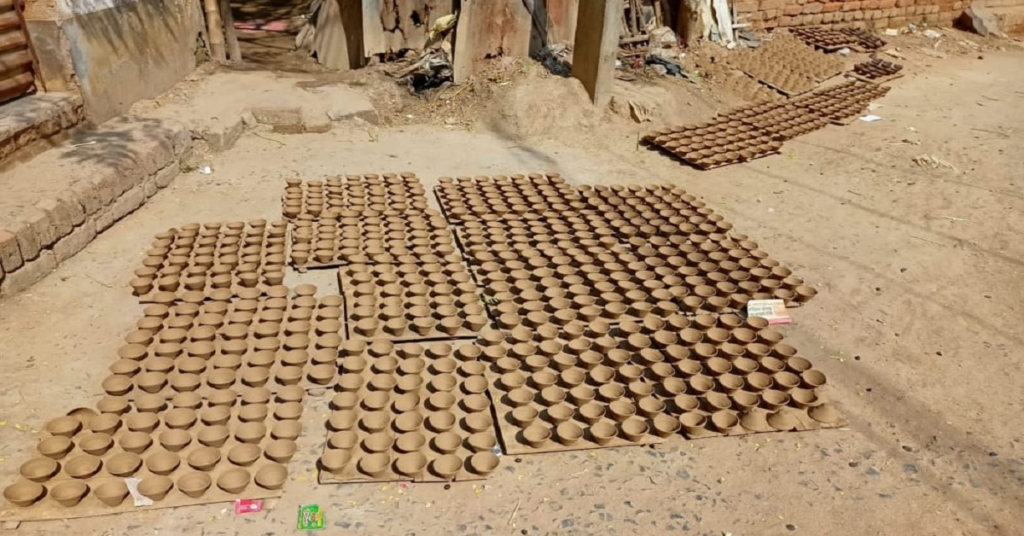Durga Puja is the biggest festival celebrated by Bengalis across the globe. It also marks the start of more festivals to come. However, this year, news reports indicate that there has been a rise in Corona infections recorded in West Bengal since Durga Puja. That puts a bit of a dampener on the next big festival – Kali Puja, on Diwali day – which is just around the corner.
Usually, or as we call them now, in the pre-Covid times, days before Diwali, every street in the country would be filled with light, and people would be buzzing around in the market buying mitti ka diyas or earthen lamps, decoration items, flower, news clothes and utensils, and jewellery. But over the last year and more, some of the brightness has faded a little bit.
CJP’s Grassroots Fellowship Program is a unique initiative aiming to give voice and agency to the young, from among the communities with whom we work closely. These presently include migrant workers, Dalits, Adivasis and forest workers. CJP Fellows report on issues closest to their hearts and home, and are making impactful change every day. We hope to expand this to include far reaching ethnicities, diverse genders, Muslim artisans, sanitation workers and manual scavengers. Our raison d’etre is to dot India’s vast landscape with the committed human rights workers who carry in their hearts, Constitutional values, to transform India into what our nation’s founders dreamt it to be. Please Donate Now to increase the band of CJP Grassroot Fellows.
The beauty of Diwalis of the past especially lay in the rows of hundreds of earthen lamps that shone and shimmered, almost connecting entire villages and cities with their divine glow. All that seems like folklore now, as earthen lamps are being edged out one by one by strings of electric lights. In a way, traditional earthen lamps are now being snuffed out by these plug-and-play lights.
And the ones who suffer the most are the potters who have for decades hand made these lamps. This was the season they most looked forward to, a good season meant their home fires were lit for the year to come. It goes without saying, that now that these artisans are not making any profits.
However, as they have for hundreds of years, the potters of Palsa village in Birbhum district refuse to give up hope, and continue to make their earthen lamps. There is still a possibility that the number of earthen lamps sold will be less this Kali Puja. As a result, the idol artists and the lamp makers are going to face huge losses. However, they do not want to dwell on that depressing thought just yet. They have, since the beginning of the year, made idols and lamps. In pre-Covid years these earthen lamps were also exported to other states and even abroad. The demand for earthen lamps was skyrocketing once. But then, that too is folklore now.
Potter Togar Rabidas says that first, the clay has to be bought and soaked in water for two days. Only then is it ready to be applied by hand to make idols, or spun on the potter’s wheel for lamps and pots to emerge. They used to make lamps, dolls, toys, pots, which had to be dried in the sun and then baked in charcoal kilns. Now the demand for earthen lamps is a fraction of the earlier days. “Our neighboring states of Bihar and Jharkhand do not produce high quality earthenware. Lots of people used to come from there to buy earthen lamps here. We earn three rupees per lamp. Even after such a low price, the demand has reduced,” said Rabidas, adding that “using earthen lamps maintains the balance of the environment properly” as artificial lights and firecrackers, according to him, are “destroying the environment, increasing the amount of carbon dioxide in the air.”
Corona virus has damaged the pottery industry deeply. The scars of this wound may remain in the minds of Palsha’s artists for life. They ask, “When will everything be fine again? When will the folds of anxiety be gone from our foreheads?” No one has the answers to the questions. Now many potters just stay at home. Hoping this way Covid-19 can be defeated for good. When they go out, they wear masks and say,“It is better to follow the government’s instructions. This war is not for anyone alone. The whole world is united in this war. We will win. Everything will be normal again. The world must be calm.”
The earthen lamps may be fewer now, but the lamp of hope is lit bright here. That itself is reason enough to buy as many mitti ka diya this season, and help a potter also have a happy Diwali.
This report is part of CJP’s Grassroots Fellowship Program, and has been written by researcher Ripon Sheikh, who is travelling around rural Bengal, tracking and documenting social and cultural movements of indigenous people.
Meet CJP Grassroot Fellow Mohammed Ripon Sheikh
This young man, who has graduated with a B.Sc degree from Burdwan University, loves trivia. Sheikh’s passion to research and seek “unknown information about World History” has earned him many medals and trophies at various University and state-level Quiz championships, and youth festivals. Sheikh is a born orator and a natural community leader. He has the potential to represent his community, state and country at a global level one day. His immediate goal, however, is to find a job so he can support his parents.
Related:
Jute farmers, and their fields of gold
CJP Impact: Churki Hansda goes from being called “Dayan” to “Di”
What happens when a ‘school’ drives to the students?
How Sunderban’s Honey Collectors fight all odds to earn their living

